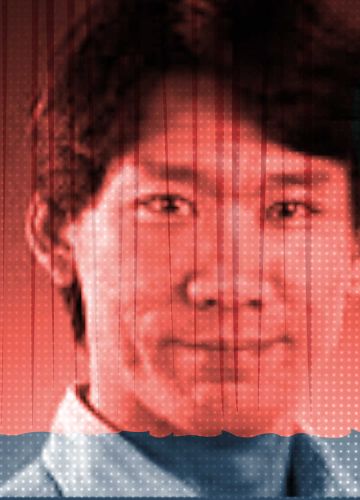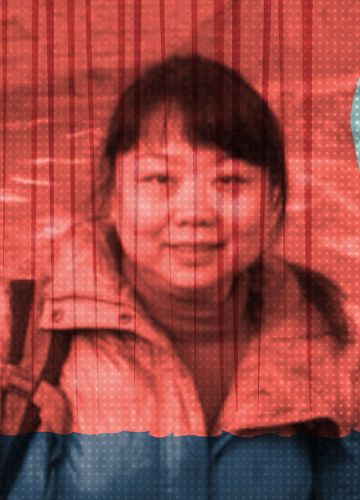The Juggling Act of Being Female, Chinese, and a Foreign Correspondent

Kevin Schoenmakers

Wang Qing
Bridging the European Knowledge Gap
Kevin Schoenmakers: How did you become a correspondent in Europe?
Wang Qing: I want to help China and the rest of the world understand each other better. After I graduated from a master’s program in the Netherlands, I first worked for a Dutch outlet where I basically explained China to foreigners. Then, in 2016, Trump’s election and Brexit happened. These two events had a major impact on young people, intellectuals, and other liberal-minded folk in China. As I’m sure young people in Europe did too, they suddenly began to wonder whether these are things that ought to happen in Western democratic systems. I was shocked too, and decided to switch my career direction to instead explain the West to Chinese people.
Before, Chinese people of my generation — born in the 1980s and ‘90s — would have a certain yearning for Western political systems. We’d respect them, and think that China could learn a lot from them. But after these two events, I sensed a general disappointment among Chinese intellectuals. At the time, I’d lived in Europe for five years. I knew that the American election and the Brexit referendum are just two forms of democracy, and that there are so many other versions. In France, for example, the far-right Le Pens have been active in politics for many years, but never made it to the presidency. Then there’s the German system, and the still different systems in eastern European countries.
I realized at the time that there are so few news reports about Europe in China, especially compared to how much we do hear about the United States. If a Chinese journalist is stationed abroad, then the chances are they’ll be in the U.S. Chinese people are more interested in America, and more people of Chinese descent live there. So there’s a long history of Chinese people writing about the U.S. And even though it’s a big place, people speak English, so a journalist can cover the entire country. But Europe is a different story. I felt like there was a big information gap.
Chinese readers are interested in Europe, but not that interested. They know some things about Europe, but also not a lot. So I figured I could become a kind of pan-European correspondent, writing from the perspective of a Chinese person living in Europe and explaining to a Chinese audience what I see and experience, and what European society is like. That’s how I ended up doing what I do now.
Kevin Schoenmakers: How does your outlet define your beat?
Wang Qing: My title is Europe correspondent. One part is covering large political and economic events. Another is to report on Chinese-European interactions, including diplomatic ties but also Chinese diaspora, Chinese overseas students, and Chinese people working in Europe.
In short, I write about European stories important to Europeans, and European stories important to Chinese people. These two sometimes overlap but they’re not always the same.
Kevin Schoenmakers: How do you keep up with the news of an entire continent? How many countries do you officially cover?
Wang Qing: In theory, I cover all of Europe, but that’s not really feasible in reality. The European Union has more than 20 member states by itself, and then there are non-members at the edges of the continent. So I cover more than 30 countries, which sounds kind of ridiculous. But, first of all, I’m not by myself. We have an editorial team in China doing remote reporting, and a network of freelancers around Europe. So sometimes when there’s some breaking news or something worth covering, it’s my job to commission an article.
When I cover something, my philosophy is to provide a pan-european perspective, which means I don’t just look at what happened in a particular European country, but also why those events are important to the continent. Some international outlets might have the resources to have one correspondent per country, allowing that journalist to have a deep understanding of that country. But there is no way I’ll be able to do that. I can’t master more than 20 languages in my lifetime. But I could look at these countries using a pan-European framework. This way, regardless of whether I’m writing about Germany, France, or the U.K., I can explain to Chinese readers what Europe is.
Kevin Schoenmakers: Are there any stories you would personally like to do but that you can’t get approval for from your editors?
Wang Qing: I work in a commercial outlet, so we have slightly more leeway than official state media. The limit is more often how much my organization is willing to invest in a particular pitch. Sometimes it’s not that you want to write something but can’t, it’s that you reported on something and want to follow-up with a more in-depth article, but that the organization doesn’t have the time and resources. In my impression, this is more likely the case when it comes to smaller European countries. There might be something interesting happening there, but Chinese readers might not know the country that well so there’s only scope for something short.
Of course, besides that, there are some sensitive topics when it comes to international relations that a Chinese outlet will be very careful with.
Kevin Schoenmakers: Because of the pandemic you’ve been in China for some months and you’ve been writing more about domestic topics. Have you noticed any difference in sensitivity of national and international news? Do you run into such issues less when reporting on other countries compared to reporting on China?
Wang Qing: When I speak with friends who also work in international news, many say they initially wanted to move in this direction because there are fewer restrictions. As long as the news is unrelated to China, you can mostly write whatever you want. But if a topic touches on China, there will be restrictions.
As for domestic news, I don’t do investigatives stories but write mostly about social and cultural issues, and there aren’t usually tight restrictions on such topics.
Kevin Schoenmakers: How many Chinese journalists are there in Europe? How many of them are, like you, correspondents for commercial media?
Wang Qing: I’ve never seen an accurate figure for this, but I’d say that there are fewer than 10 Europe correspondents who work for commercial Chinese media. The overwhelming majority of Chinese journalists in Europe work for state media. They have enormous teams. I’d estimate that more than ten state media outlets have offices in Brussels, for example. Some of those might just have one or two people, others have dozens.
At the same time, the number of correspondents for commercial media is shrinking, and most of them are financial reporters who live in London. On the European mainland there are a few in Paris and in Berlin, but they might not all be on full-time contracts.
Kevin Schoenmakers: Why is the number of correspondents working for commercial media shrinking?
Wang Qing: On the one hand, state media have grown bigger both at home and abroad, and there is less space for commercial media. In the past, such media could do hard-core investigative reporting, but now that’s gotten harder.
On the other hand, it’s worth noting the rise of self-media in China. I believe the difference between state media and commercial media has gotten smaller in recent years, and the new division in the Chinese media landscape is that between self-media and institutional media — which includes both state media and commercial media. Self-media means people or organizations who most commonly post content on social media like WeChat, Weibo, and Douyin, and who are increasingly blurring the line with writing news. They adhere to different standards though. When they write about Europe, they might find a few articles in English media, aggregate them, and write it up in a dramatic and eye-catching way. Self-media have quickly gained a lot of traffic, influence, as well as advertisement. But institutional media can’t work like this.
Commercial media have also experienced a brain drain, and advertising revenue is declining every year. They’re fighting for survival. So the disappearance of correspondent positions at commercial media is a reflection of their crisis at home.
In the past, such media could do hard-core investigative reporting, but now that’s gotten harder and harder.
Growing Mistrust and Hostility
Kevin Schoenmakers: Have you noticed anything from the worsening China-West relations? For example, in China many western journalists say it’s becoming more difficult to find interviewees. Have you noticed anything similar?
Wang Qing: In general, my experiences in Europe have been positive. European society has better civic education, so people understand the importance of news media. But there have been a few incidents in the past two years. Sometimes people refuse to be interviewed because I’m a Chinese journalist, even saying, “I can’t trust a journalist from a Chinese news outlet.” Explaining the reporting you do or the kind of organization you work for won’t put them at ease.
When I first started as a reporter in Europe about eight years ago, I was never refused an interview because I’m a Chinese journalist. It might be because there is much more China coverage in Western media now. In the past only people in the so-called China-watching community would pay attention to the country, but now regular people in the West are also increasingly interested in China. But their interest was piqued by negative news stories. It’s not because, for example, they traveled to China and thought it was a fascinating place.
Hostility toward China is on the rise in both the United States and Europe. People like us, whose role is in between China and other countries, will notice such changes the earliest.
Kevin Schoenmakers: What kind of people will sometimes deny your interview requests? Just regular people, or companies and governments?
Wang Qing: All three you mentioned will sometimes deny interview requests, but people at companies or governments have received PR training so they won’t directly tell you it’s because you’re from a Chinese media outlet. Only regular people will.
I can think of an example of when I went to Greece to do a story about China buying a port there. Because the port itself is considered a scenic spot, someone offered tours on AirBnB. I thought this was very interesting, also because it mentioned China. So I wanted to join the tour and interview the person behind it. But because I explained who I was he didn’t even allow me to join the tour, saying that he thought Chinese media would distort his words.
The opposite also happens. When I went to report on Brexit I discovered a lot of English people who supported Brexit were eager to talk to Chinese media. They figured that after Brexit, the U.K. would need to become friends with countries outside the European Union and that China would be a good country to be friends with, so they were willing to speak with Chinese media.
Kevin Schoenmakers: Do interviewees sometimes question your motives because they assume your outlet is a propaganda outlet?
Wang Qing: Yes! The international perception of Chinese journalists has changed a lot in the past two years. I often get asked what it’s like to be one. I think, in the English-speaking world, there is a subtle bias toward Chinese journalists, where people assume that you need to create propaganda. But Chinese journalists are a varied group of people, including more and more Chinese nationals now working for international media. I have some friends who work for official state media, and their work isn’t all propaganda either. Within the limits placed on them, they too do work that I think improves Chinese and Western people’s mutual understanding.
Chinese journalists aren’t so different from journalists in other parts of the world. The motivations they have and the training they receive are broadly similar. But I do think they are treated differently. A South Korean reporter, for example, is much more easily trusted in the West than a Chinese reporter, even if the articles they end up writing are broadly similar.
Kevin Schoenmakers: And, the other way around, has the perception of Europe changed among your readers?
Wang Qing: First of all, Chinese people’s interest in Europe is not as great as their interest in the United States. Then, their perception of Europe is split into two. They look up to Europe but also look down on it, and these two contradictory viewpoints exist at the same time.
They want to see the good sides of Europe and regard it as having a more advanced market, governance, and society that China should learn from. This includes things such as Europe’s education, health care, and pension systems. Recently, China allowed three children per couple, but young people in China don’t really want to have children and people wonder why that is. Perhaps Chinese society doesn’t support and subsidize women and families enough when it comes to having children? So people look to Europe to see what they do. What kind of welfare do single-parent families receive, for example? How do governments support sending children to day care or to school? Chinese people are very interested in this aspect of Europe.
One the other hand, Chinese people look down on Europe, thinking that even though Europe was very civilized and advanced in the past, it has more recently been plagued by terrorist attacks, refugee crises, demonstrations, riots, and other chaos — casual readers love to read this kind of news. Especially after the COVID-19 pandemic, this second perception has become stronger. Many believe that China controlled the pandemic better than Europe, where it caused a lot of chaos. People increasingly feel like Europe isn’t as good as it used to be, or even that it’s become a complete mess and that China is better now.
Kevin Schoenmakers: Journalists who write about China are often criticized either because they are too soft or too harsh in their analysis of the country. Are you ever accused of being one or the other about Europe?
Wang Qing: Yes, I’ve encountered both. Refugees are a topic that easily causes controversy on Chinese social media. When I tried to explain some of the complexities behind Europe’s refugee crisis, readers who might not be very familiar with Europe and saw the refugee crisis as a major disaster thought I was being too soft.
At the same time, some friends have told me they think my analysis of Brexit is too harsh, that I overestimate the impact it will have on the U.K. But based on my interviews I judged at the time that its impact will be quite serious.
I think my situation is a bit different compared to Western journalists in China, however. If you work for an established international media outlet, your analysis will have an impact on government policy. Even though sometimes people in government or academia might read what I write, what I write is mostly for ordinary Chinese readers. So its impact on policy is small. This is the case for many reporters working for commercial media, and this probably is a reflection of the status of media in China.
Kevin Schoenmakers: Are there any misconceptions about Europe that stand out, about which you cannot convince your readers or editors otherwise?
Wang Qing: One example that I find quite interesting is about Europe’s attitude towards regulation. The European Union has introduced a lot of digital regulation in recent years, which is a source of discussion in China. From a Chinese perspective, Europe is doing this because it doesn’t have strong internet companies like Facebook or Alibaba.
Some people — not me — think Europe’s economy and status have slipped because there is too much regulation. This idea is widely shared by my fellow Chinese journalists who do financial and economic reporting. I will try to explain to them that the so-called decline of the European economy isn’t actually because they overregulate, or that this regulation is necessary and might also be adopted in China. [NOTE: In August 2021, China passed what one article in the National Law Review called “the world’s harshest data privacy law,” with stricter data security requirements some experts found to be opaque.]
I think the larger context of this is that Chinese intellectuals, after experiencing China’s marketization drive in the early ’90s, have formed a consensus that less oversight promotes economic development. So they don’t understand why Europe would choose to implement more regulations.
As for misconceptions among the wider public, I can take my mother as an example. When the yellow vest movement damaged the Champs Elysées, the Chinese internet was overflowing with fake news about how Paris had become a hell on earth. So my mother will think that Europe is total chaos. Sometimes due to the time difference, when I wake up, my mom will have already sent me 10 different articles she saw online about how Europe is a mess, and ask whether I shouldn’t consider moving back home.
Navigating the Shrinking Space of Weibo
Kevin Schoenmakers: You’re quite active on Weibo, where you have more than 75,000 followers. Do you consider this part of your job as a journalist, to build an audience?
Wang Qing: I don’t really have a detailed strategy for my Weibo. But I want it to be a personal thing, a channel through which I engage with what is happening in China. I know many foreign reporters will use Twitter to promote their work. I sometimes do that, but only when I think that what I wrote is relevant to what is already being discussed on Weibo at that moment.
Weibo might be the only public space left in China. Even though its scope is shrinking too, there is still a lot of discussion on Weibo every day, and the topics are very different from what foreign media report on when it comes to China. What is talked about on Weibo isn’t of national importance, but it’s still meaningful to me. People talk about gender issues, consumerism, and other things that young Chinese people are concerned about. I want to engage in these discussions.
Sometimes I will bring a European perspective. One time, a Chinese rental platform had some funding issues that caused its young customers to suddenly have no houses to live in. This sparked a discussion on whether it’s better to buy or rent an apartment. I shared my experience renting a house in Europe, and explained why young people in Europe don’t seem to be in a hurry to buy a house because there are policies that protect tenants.
But I won’t write daily posts about what happened in the EU today. I don’t want my account to be a press release machine.
Kevin Schoenmakers: In recent years, discussion of China on Western social media is at times very black-and-white — you’re either in favor of or against China. Is the discussion of Europe on Weibo similar?
Wang Qing: There is such a trend. Especially since the COVID-19 pandemic and the worsening international climate, Chinese social media users have become more antagonistic toward Europe and the U.S., or the West in general. Fewer people are willing to understand the complexities of the world, or they no longer speak up and are drowned out by more radical voices.
The fact that European countries made mistakes in how they handled COVID-19 only adds to this. Chinese social media users will think, “Why can’t we criticize them? Why do we have to agree that Europe is a nice place? Why do we need to be nuanced?” I don’t think this is something particularly Chinese. All around the world people seem to have lost their interest in and patience for understanding another culture’s complexity.
Kevin Schoenmakers: On Twitter, female journalists say they face constant harassment. Is this also an issue on Weibo?
Wang Qing: Yes, there is a lot of harassment aimed at women on Weibo as well. It’s not necessary because they are journalists, but just because they are female. I think an important context is that on Weibo, gender issues are very actively discussed — far more than any other topic. It might be one of the few issues that can still be discussed publicly on the Chinese internet to the same degree it is discussed internationally. Usually there are people in strong support and in strong opposition to certain gender issues, and as a result women will face a lot of attacks by patriarchal users.
I recently posted something about the Kris Wu rape case that got tens of thousands of comments. Many people agreed with my point of view, but I also got a lot of hateful responses, including private messages, saying “Why do you want to turn this into a gender thing?” They think feminism in China is going too far. People who have grown up in East Asian cultures may not be accustomed to women speaking out in public. So when you do speak up, a lot of people will attack you for your gender.
Kevin Schoenmakers: Do people ever send abusive comments because you are a journalist?
Wang Qing: That happens as well. I think because journalists and other public intellectuals have become stigmatized in China. In the past, say five or ten years ago, when you said that a person is a public intellectual, it was a compliment. Everyone would think such a person is very knowledgeable, that they have a critical perspective, and are doing something good for society. But views have shifted to public intellectuals being people who don’t want the country to do well. So people with these identities are attacked a lot. But still, I mostly receive abusive comments because of my gender.
Podcasting Through the Pandemic
Kevin Schoenmakers: How would you describe your podcast? Who are your co-hosts? What do you talk about?
Wang Qing: I started the podcast together with two friends who are former journalists at the end of 2019. We began because we’d often talk and when media people talk they mix their private stories with things that are in the news, and we figured conversations like that can be quite interesting. So we thought about how to present this to an audience and turn it into a podcast.
We named it TheWeirdo (in Chinese: 不合时宜, meaning to be out of step with current thinking) because we believe that in Chinese society there are a lot of people like us who feel like they may not be in line with the mainstream of the era, who are independent but still interact with society. We hoped to bring people like this together through the podcast.
We talk about domestic and international current affairs, but also issues that young Chinese people are concerned with such as education, buying a house, and having children.
Kevin Schoenmakers: Podcasting took a while to take off in China compared to the West. Why do you think that is? Have you noticed your podcast’s audience has grown a lot recently as well?
Wang Qing: I saw an industry analysis that said many American podcasts are made by institutional media who have experience with making radio, such as NPR. But Chinese podcasts are almost all very grass-roots. Podcasters might be journalists, like us, but there is no institutional support. I don’t have a radio background either, I’ve mostly done written journalism. There are very few Chinese media companies that are systematically making podcasts.
One reason podcasts are gaining popularity is that across Chinese online platforms, the quality of the content is decreasing. Because, depending on whether you want to write an article for 100,000 or 1 million people, your approach has to be very different. For the former, you can write in a very refined way that only highly educated people might understand. For the latter, you have to write in a way so it is very easy to understand. So with other content decreasing in quality, podcasts have become something that highly educated people enjoy.
One reason podcasts are gaining popularity is that across Chinese online platforms, the quality of the content is decreasing.
Podcasts really gained attention in China during the pandemic last year. Lots of people had to stay at home and wanted good content to pass the time. Our audience also grew during that period. When we began in late 2019, we had no idea we’d grow this much, or even be successful at all. But our conversations resonated with listeners. It’s more important than anything for a creative to find an audience that understands your content. It will really boost your morale. So when we grew our audience and they responded with writing letters and whatnot, it was very inspiring to us and made us keep going.
For example, during the pandemic last year when a lot of flights were cancelled and many students who wanted to go abroad were unable to go. Lots of people were wondering whether China would be cut off from the world. We talked about studying abroad in an episode, and I said that because of the worsening international climate in which every country is isolating itself, people who can form bridges across borders should go abroad more than ever. Afterward some listeners said that they had abandoned their study abroad plans but because of us they had changed their mind. A year later these people are on their way to foreign universities. Stories like this inspire us to keep at it.
Kevin Schoenmakers: How big is your audience?
Wang Qing: We have about 500,000 subscribers across all platforms. Popular episodes are downloaded up to 700,000 times, less popular ones fewer than 200,000 times.
Kevin Schoenmakers: Some people say podcasts are popular in China right now because they are quite loosely regulated. Would you agree?
Wang Qing: I think the restrictions on certain topics in place on other platforms are also there for podcasts. The difference lies in the audience. Podcasts listeners are relatively highly educated and liberal minded. And when you listen to a podcast, you need to spend an hour to listen to an entire episode, so that means you can deal with a lot of nuance and won’t get furious when you don’t agree with someone’s argument. This gives podcasters more space, but they still have to adhere to certain limits on content.
Kevin Schoenmakers: Have any of your episodes been taken offline?
Wang Qing: Yes, they have. When you discuss something that’s closely related to a recent news event that’s a hot topic, that episode is at a higher risk of getting taken down.
Kevin Schoenmakers: I listen to some Chinese podcasts, and I’ve noticed none of them run ads. Do you know why that is? Have you been contacted by companies to place ads?
Wang Qing: Commercialization of podcasts is a hot topic right now. We regularly have people from our audience who work at some or other large company and contact us to ask whether we’d want to join their promotional campaign. But the way advertising is done in Chinese podcasts isn’t the same as in English-language podcasts. Rarely will there be ad reads before the start of an episode. The format is more commonly that a company has something to promote and the podcast will create content based on that. But as far as I know, Chinese podcasts, especially those with large audiences, are very selective. When choosing an advertiser you have to make sure it fits your brand to keep your audience happy.
Kevin Schoenmakers: Have you placed such ads?
Wang Qing: We have created some content for brands, mostly regarding gender topics.
Kevin Schoenmakers: What kind of brand?
Wang Qing: I won’t name them, but we mostly work with brands that promote ideas rather than products, and these ideas need to be in line with our values. One of them was a relatively large Chinese e-commerce brand. They had a report about consumer behavior and had noticed men were buying more yoga mats and women were buying more boxing gloves. This is against stereotypes, so we thought it was an interesting phenomenon. They hoped we could make an episode about gender stereotypes and we felt this fit our podcast.
Kevin Schoenmakers: Lastly, I’d like to discuss one of your episodes that was was about what it’s like to be a woman, a journalist, and a person living abroad. In China or at Chinese media outlets, what is the difference between being a female journalist and a male journalist?
Wang Qing: Female reporters in China face many different stereotypes. One is that, when there’s some big news event, female reporters are just there as eye candy or to fulfill a quota, and not because of their ability.
And, though the number of female reporters within media organizations is pretty big, the executives are men. In journalism school there are also way more women than men, but the decision makers are mostly men. Male reporters have higher salaries, have more opportunities to make a name for themselves, and are given more on-camera appearances.
The professional life of female reporters in China is generally quite short. Unlike in other industries, as a journalist you have to be on the frontline. But a woman in her 30s will have to think about having children and taking care of her family, making it hard to do on-the-ground reporting. In other professions, your 30s is a time when you have finished your training and you enter a golden age of productivity. But as a female journalist, you will find that there are fewer opportunities for you because you have your family responsibilities.
In addition, in the past two years there have been a lot of reports of violence against and sexual harassment of female reporters. These incidents have always existed, but because of the gender movement, this has been getting wider attention and has thus become more visible.
Kevin Schoenmakers: Would you say more women are moving into positions of leadership within Chinese media?
Wang Qing: I think a very interesting change is that the rise of self-media is providing women with more opportunities. I think gender-wise there has been no change in institutional media. They’re part of the establishment, so men dominate editor-in-chief or CEO positions. But because we now have self-media, many women leave institutional media and start on their own path that is outside the establishment and doesn’t have the same historical baggage. They become their own bosses, and they do really well creating fresh content and valuable brands.
So self-media has had some impact on the traditionally male-dominated media industry, which I think is a positive development. Women have another source of opportunities, and they’ve discovered they are no worse than men, that they can be media directors, and that they can have a family while also working on their career. There are many female media professionals around me who have successfully started their own businesses.
Kevin Schoenmakers: In the episode I mentioned you say that younger women who are considering a career in news media often message you asking for advice. What do they ask you and how do you respond?
Wang Qing: People want to know what it’s like to be a female reporter and a foreign correspondent; how to enter this career; what the career path is like; and what the opportunities and challenges are.
I think a big reason they reach out to me is that I’m on Weibo, and they sooner believe advice from a person than from an organization. There is also a trend in China called “girls help girls.” People are more aware now of the power that connections between women can have. On Weibo this atmosphere is now very noticable. If a younger woman is looking for advice, she’ll reach out to another woman rather than a man, because he’s not facing the same situations.
I don’t really directly give advice, because everyone’s circumstances are different. But I will describe my situation, the challenges and problems you will face as a female journalist in China, and how these aren’t always things you can solve through your own efforts.
If you are going to be a reporter in China, one of the questions people will often ask you is: how long do you plan to do this? Careers in this industry seem very short. It’s not as in international media where there is a track from junior reporter, to senior reporter, to some overseas postings, to an editor position, and a chief editor position. In China, this might exist in official state media, but in commercial media, the path forward isn’t very clear.
When I look in front of me, it’s difficult to find a role model whose career path I can follow. As we discussed in the episode, when we were young there were some female reporters who we could take as our role models, but they have all left the industry. This is very dispiriting, and makes it hard to know what your next goal or your next stop could be. But perhaps this is something that the current generation of female reporters should do. Because the people before you didn’t create a path, you have to look for one yourself.
I had my doubts in previous years, but I’m more determined to go on doing this for as long as I can. But being a journalist might not be my one and only job. I might start some other projects, but always carry the journalistic mindset and mentality with me. I might not be in a media company but be more flexible. Social media has brought many new opportunities and spaces that didn’t exist before. If you asked me now what I would do if I could go back to the beginning. Then I think I would still choose to be a journalist.

Kevin Schoenmakers






